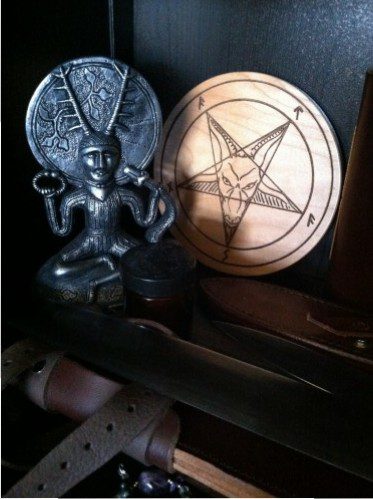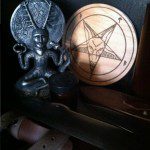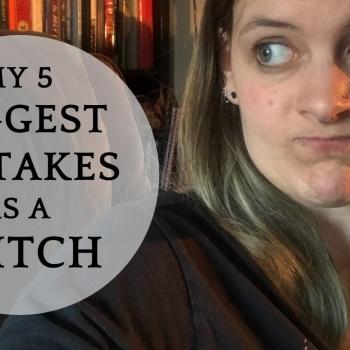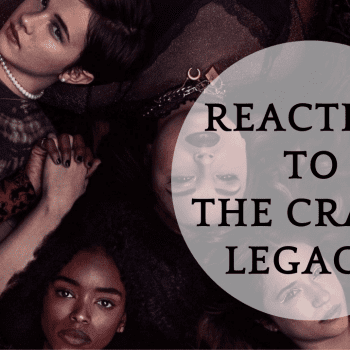 I’ve been resisting writing about The Witch, which I saw a few days ago (and loved, for the record, mostly because Puritans are my favorite thing about American history). I’ve received a number of e-mails and messages asking for my own reactions to the movie, and while media reviews aren’t really my thing, I feel like conversations about witchcraft movies continually bring up wider concerns in witch communities that don’t really, at their core, have much to do with individual media portrayals.
I’ve been resisting writing about The Witch, which I saw a few days ago (and loved, for the record, mostly because Puritans are my favorite thing about American history). I’ve received a number of e-mails and messages asking for my own reactions to the movie, and while media reviews aren’t really my thing, I feel like conversations about witchcraft movies continually bring up wider concerns in witch communities that don’t really, at their core, have much to do with individual media portrayals.
Those concerns are worth looking at without the lens of any singular example (because we’re never really talking about media…this movie will be out of theaters in a few weeks and we’ll move on to the next thing, which is really just the same thing repackaged). We’ve been freaking out about the same stuff for decades (though I’m glad to see mostly positive reviews of this latest witch film), and maybe this way I can just direct people here every time a new witch movie (or TV show, or book everyone hates, or whatever) comes out:
OMG SATAN
I’ve already written at length about my own feelings on Satan and witchcraft. The historian in me is very interested in the relationships among medieval European church(es), constructions of witchcraft by various classes of people in various places in Europe, Satan, how all of that plays out in the American colonies, the British occult revival, the development of Wicca, the rise of other contemporary witchcraft traditions, and on and on. The historian cares about the whens and wheres and hows. That stuff is fascinating and gets all my religious studies jollies roiling. It’s a fun intellectual exercise, even if it’s basically just a hamster wheel.
But the practitioner in me does not give a shit.
I don’t care even a tiny bit whether or not anyone thinks I’m worshipping Satan. I don’t care if my horned god has ties to Satan. I don’t care that other people have theological positions that tell them that my gods are really other gods, or not gods, or evil gods, or whatever. I have no investment in those arguments at all.
And the reason I don’t care is because I have no emotional investment in Satan, and no context in which Satan is important in my day-to-day life. Satan was not part of my upbringing, is not part of my home life, and has nothing to do with my job, my finances, my HOA, or my ridiculous healthcare premium. Satan has about as much impact on my life as any other religious mythology that isn’t my own. Other Wiccans keep telling me to watch out—as though America is going to suddenly become a theocracy where the government starts targeting Wiccans—but my experience working in the public school system here in North Carolina tells me that other concerns (race, immigration, poverty) are about a million times more pressing. People are afraid of a lot of things here, but I’m not very high on that list.
That’s not to say that you shouldn’t care or that it’s inherently unimportant. For some people it’s very important, and I get that. Your circumstances are probably very different from mine. Maybe Satan and how people feel about Satan has real bearing on your life because of your own background as a Christian, your family, or just your personal investment in particular theologies. But a lot of that is personal, and has to be dealt with personally, primarily. I don’t say that to belittle that problem, only to explain why not everyone is participating in the conversation. People keep expecting me to be outraged about Satan, and I’m just never going to be outraged. There are too many other things that make me way angrier.
But REAL witches don’t do that!
When I was a precocious (okay, irritating) little girl, I once self-righteously explained to a babysitter that the unicorn picture she’d drawn for me was inaccurate because the unicorn in question had neither cloven hooves nor the tail of a lion. And obviously unicorn mythology clearly dictated that these things must be present. It would be a good while before I could appreciate that, actually, stories about unicorns extend beyond Peter Beagle and many kinds have been described throughout history, around the world. In the meantime, I was just being ill-informed and obnoxious.
Likewise, there are many kinds of witches.
There’s a thing that always happens when a new witch movie comes out: contemporary witches, operating under the assumption that they own the word and get to dictate how everyone else uses it, complain that real witches (by which they mean themselves) aren’t represented. This is especially true when the witch characters are evil.
But some types of witchcraft are necessarily about Satan, evil, devilry, killing babies, and turning into spooky animals.
They just are.
You don’t have to like it, but, historically, witchcraft has a long, well-documented relationship with evil. When artists, historians, writers, and the public at large make connections between witchcraft and evil, they’re not out of line. We are the anomaly.
“Real witches would never do that.”
“Real witchcraft has nothing to do with Satan.”
On and on since at least the mid-twentieth century.
But insisting that a movie is offensive because it includes a version of witchcraft that doesn’t reflect your experience in 2016 is absurd, and only reflects a failure to critically engage with history.
As usual, the real problem is that we’re all using the word “witch” differently (we also use the word “Satan” differently, by the way).
It doesn’t really matter what kind of contemporary witch you are. As a contemporary witch, you’re just not historically representative. In different historical eras, in different regions, amongst different peoples, there are a lot of different kinds of witches. And some of those representations are self-concious fabrications, invented for entertainment and not representations of real people out in the world. There’s no point in being mad about made-up witches any more than there’s any point in being mad about made-up unicorns. The movie (whatever the movie) is not inherently inaccurate because your kind of witchcraft isn’t represented.
Sometimes particular media representations have real impact on what people think contemporary witchcraft is like (as Charmed did, or The Craft), but most of the time this impact is minimal. In the grand scheme of things, I’m usually more concerned about other social and personal issues.
None of this is to say that any representation of witchcraft is necessarily good, valuable, useful, praiseworthy, or welcome. Some are hurtful. Many are just boring. Some are designed to be historically accurate and just aren’t (because interpreting history is actually a learned skill that specialists spend their whole lives practicing). Some seek to be representative of contemporary practices and fail (because describing and critically engaging with religion—or whatever you think witchcraft is, because you can say it is or isn’t a religion all you want and it still won’t make you right in every case—is also a learned professional skill). But I wish we could move on from the whole “But Satan!” and “That’s not real witchcraft!” kneejerk responses.
So I liked the movie because there were Puritans (who are super scary, no witchcraft required), lots of good references to real documents and histories (woo religious studies nerd!), and witches that felt familiar and visceral. I also really like goats (my movie standards are not always high). There are plenty of great reasons to dislike it, I’m sure. But because “witches have nothing to do with Satan” and “this isn’t real witchcraft” aren’t particularly good ones.











